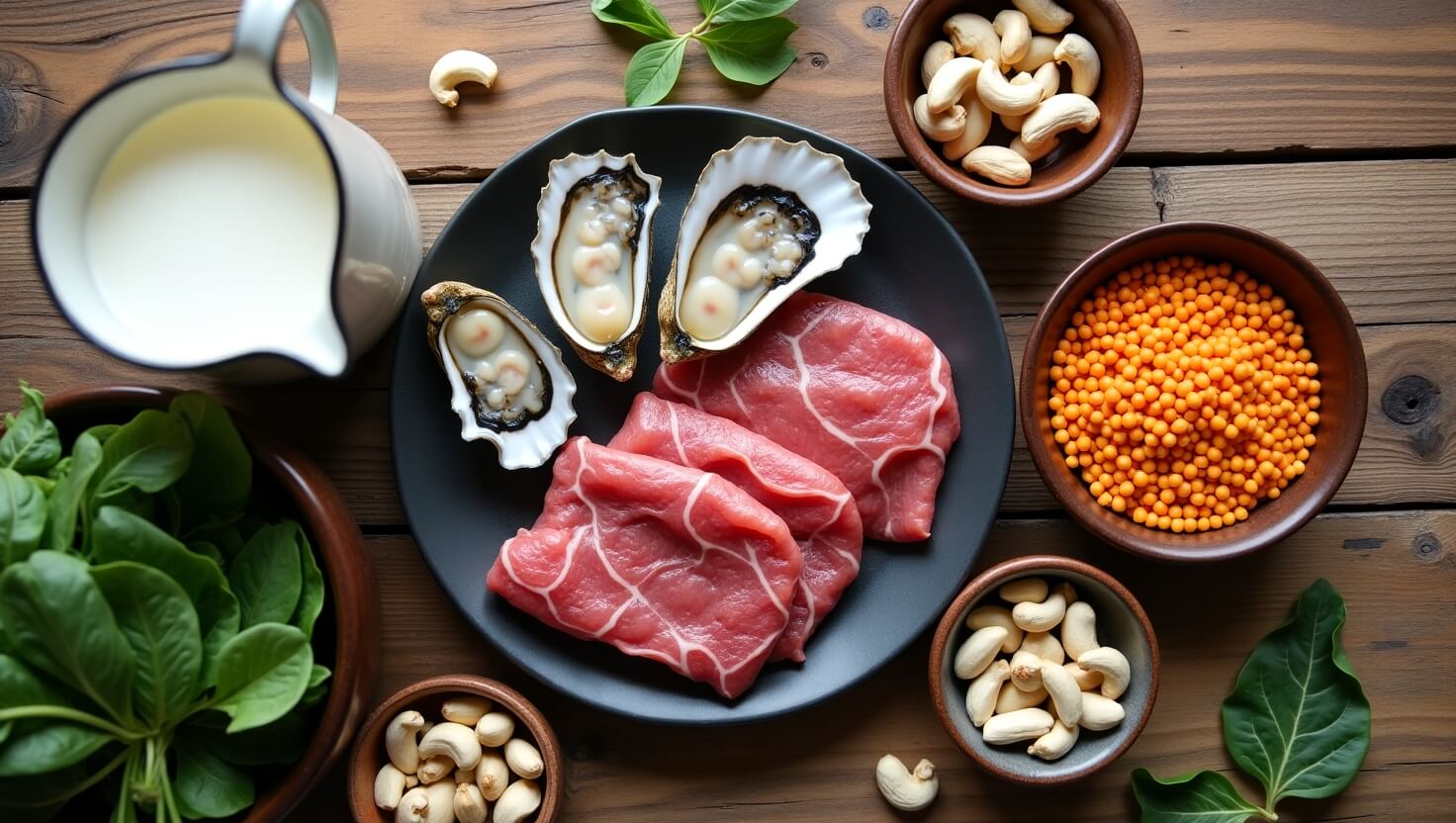
A healthy assortment of zinc-rich foods such as oysters, beef, lentils, pumpkin seeds, nuts, and dairy products displayed on a wooden table, representing natural sources of zinc for better health.
By Emma on September 11, 2025
Foods That Contain Zinc – Best Sources of Zinc-Rich Foods
Zinc is one of the most essential minerals for human health, yet it is often overlooked in daily nutrition. This trace mineral is required in small amounts, but its impact on overall health is immense. From supporting immunity and wound healing to maintaining healthy skin and aiding reproduction, zinc plays a vital role in numerous bodily functions. Since the body does not store zinc in large quantities, it must be consumed regularly through diet.
In this article, we’ll explore why zinc is important, how much you need daily, and the best foods that are rich in zinc.
Why Zinc Is Important
Zinc is a key mineral that affects many processes in the body:
- Boosts Immunity – Zinc is crucial for immune cell development and helps fight infections.
- Promotes Growth and Development – Essential for childhood growth, adolescent development, and overall cell repair.
- Supports Wound Healing – Plays a role in collagen formation and speeds up recovery.
- Maintains Healthy Skin and Hair – Prevents acne, dandruff, and brittle hair by supporting skin cell turnover.
- Improves Reproductive Health – Vital for fertility, hormone regulation, and sperm production.
- Enhances Taste and Smell – Zinc is necessary for sensory perception.
Daily Zinc Requirements
The recommended dietary allowance (RDA) for zinc varies by age and gender:
- Men: 11 mg per day
- Women: 8 mg per day
- Pregnant women: 11 mg per day
- Children: 2–8 mg depending on age
Athletes, vegetarians, and people with digestive issues may need more zinc due to lower absorption rates.
Foods That Are Rich in Zinc
Zinc is found in both animal-based and plant-based foods. Here are the top dietary sources:
1. Oysters
Oysters are by far the richest source of zinc, containing more zinc per serving than any other food. Just 6 medium oysters provide nearly 500% of the daily requirement.
2. Red Meat
Beef, lamb, and pork are excellent sources of highly absorbable zinc. A 100-gram serving of lean beef provides about 5–6 mg of zinc, nearly half the daily requirement.
3. Poultry
Chicken and turkey, especially dark meat, provide moderate amounts of zinc. Adding poultry to your weekly meals helps improve zinc intake without too many extra calories.
4. Shellfish
Besides oysters, other shellfish like crab, lobster, and shrimp are rich in zinc. They are a great addition to seafood lovers’ diets.
5. Legumes
Beans, chickpeas, and lentils are plant-based sources of zinc. While they contain phytates that can reduce zinc absorption, soaking, sprouting, or fermenting legumes can increase their bioavailability. Chickpeas and lentils make a great base for zinc-rich vegetarian meals.
💡 If you’re planning to add legumes and zinc-rich foods to your shopping, you can organize your grocery list easily with OnlineGroceryList.com. It helps you keep track of healthy essentials without forgetting them during shopping.
6. Seeds
Pumpkin seeds, hemp seeds, flaxseeds, and sesame seeds are excellent zinc-rich foods. Just a handful of pumpkin seeds can provide about 2 mg of zinc. Sprinkling seeds on salads, smoothies, or breakfast bowls is an easy way to increase intake.
7. Nuts
Cashews, almonds, and peanuts are good sources of zinc. Cashews, in particular, provide around 1.5 mg per ounce. Nuts are also packed with healthy fats and protein, making them a perfect snack.
8. Dairy Products
Milk, cheese, and yogurt contain zinc that is easily absorbed. A single cup of milk provides about 1 mg of zinc, making dairy a simple addition to meet daily needs.
9. Eggs
Eggs contain a moderate amount of zinc, with one large egg providing about 1 mg. While not the richest source, eggs contribute steadily to daily intake.
10. Whole Grains
Wheat, quinoa, rice, and oats provide zinc along with fibre, iron, and B vitamins. Opting for whole-grain bread or oatmeal boosts zinc while supporting digestion.
11. Vegetables
While most vegetables are not high in zinc, some contain small amounts. Potatoes, spinach, kale, and mushrooms provide 1–2 mg per serving. Though modest, they contribute to overall intake.
12. Fortified Foods
Many breakfast cereals and snack bars are fortified with zinc, making them an easy way to meet requirements, especially for vegetarians and children.
Tips for Better Zinc Absorption
- Pair zinc-rich foods with protein for improved absorption.
- Avoid excessive alcohol and processed foods, which interfere with zinc levels.
- Reduce intake of high-phytate foods (unsoaked beans, whole grains) unless prepared properly.
- Consider zinc supplements only if prescribed by a healthcare provider.
Zinc Deficiency – Signs to Watch For
A lack of zinc can cause health issues such as:
- Frequent infections
- Slow wound healing
- Hair loss and brittle nails
- Loss of appetite
- Skin rashes or acne
- Poor growth in children
If you notice these symptoms, consult a doctor for evaluation.
Final Thoughts
Zinc may be needed in small amounts, but its benefits are massive. From supporting immunity to aiding growth, skin health, and fertility, it is a mineral you cannot afford to miss. By including zinc-rich foods like oysters, beef, legumes, seeds, nuts, and dairy in your daily diet, you can meet your nutritional needs naturally.
Whether you are a non-vegetarian, vegetarian, or vegan, there are plenty of food choices to ensure you get enough zinc every day. And to make grocery planning easier, you can create and manage your shopping list at OnlineGroceryList.com, a free tool that helps you stay organized while focusing on healthy eating.